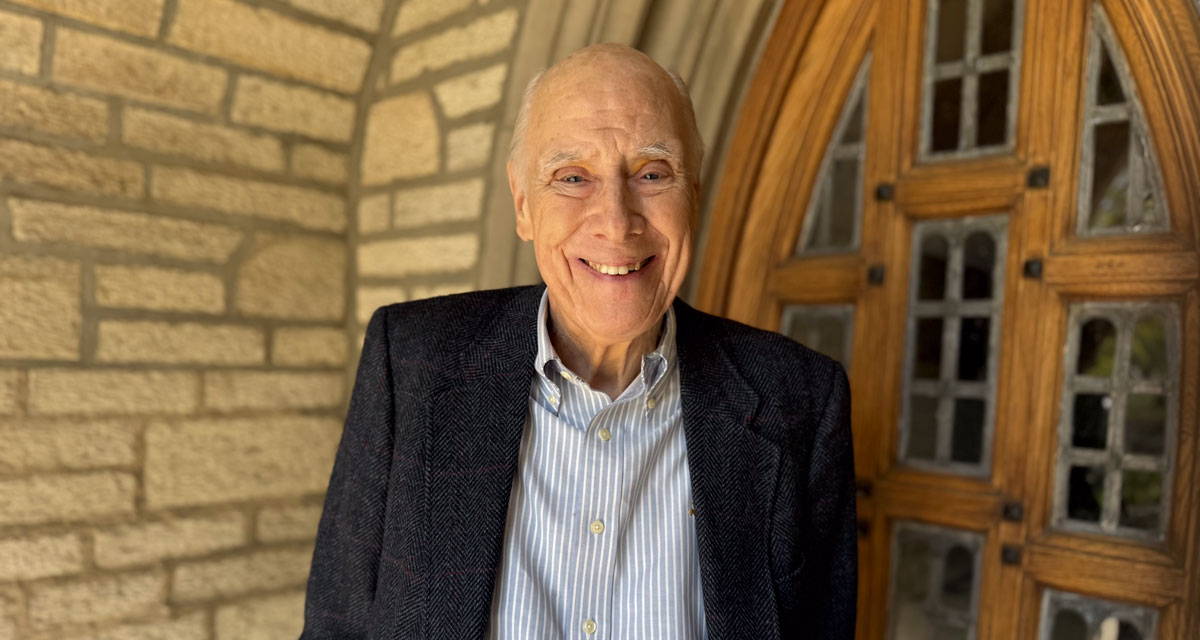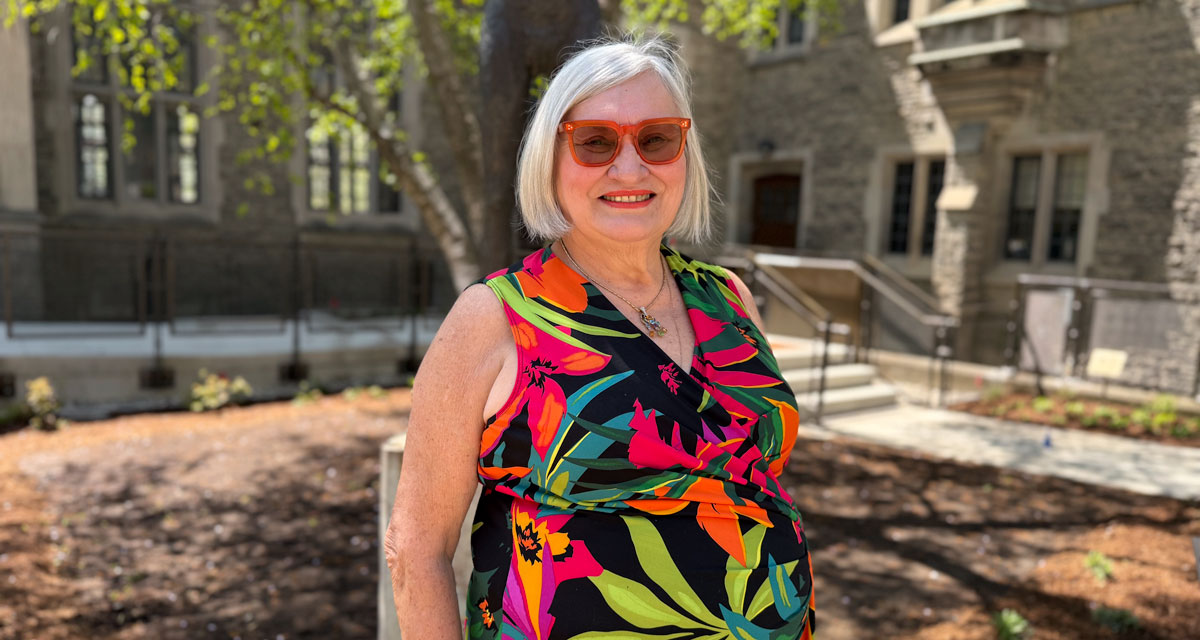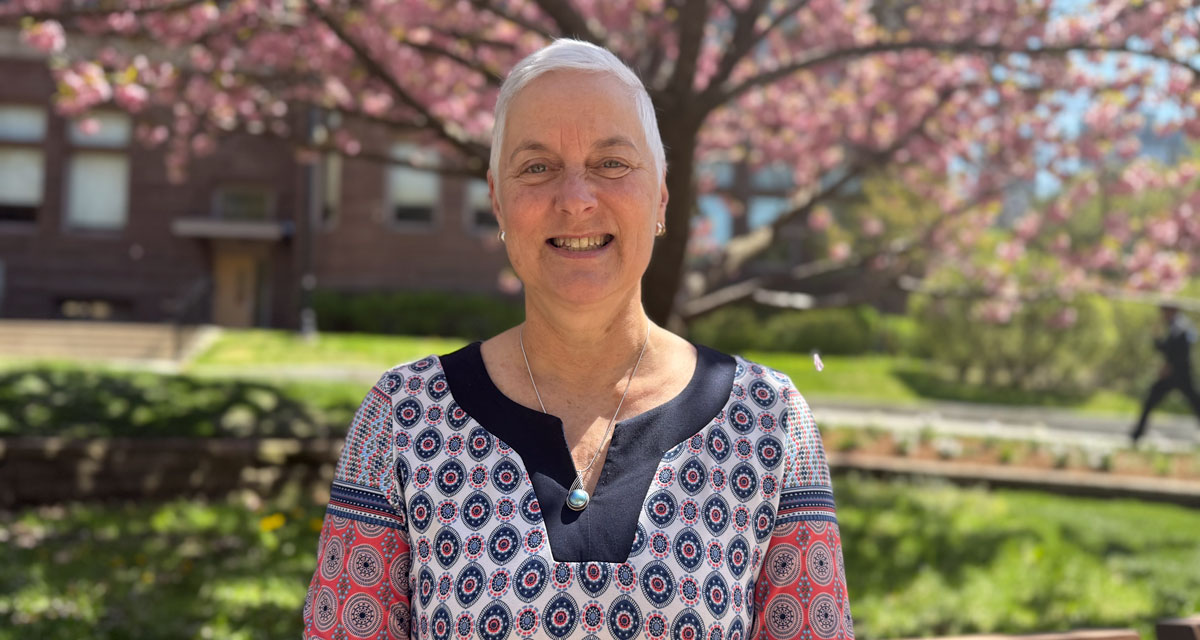Emmanuel Alumni Celebrate Faith, Community and Lifelong Impact
By Jennifer Little
From ministering in prisons to studying with a future pope, Emmanuel College graduates have remarkable stories shaped by their time at the College. The Emmanuel College community came together on May 12 for this year’s Alumni Day to reconnect, reflect and celebrate their shared roots in faith. Meet three of our alumni who share how Emmanuel continues to influence their spirituality and ministry over the years.
Richard Moffat Emm 6T5, Emm 7T4

Richard Moffat was proud to be the earliest graduate at this year’s Emmanuel College Alumni Day, 60 years after he graduated with the Class of 1965.
“It kind of boggles the mind that I earned my Master of Divinity 60 years ago,” he said. “But I’m proud to represent my class and the values we shared.”
Moffat said that when he first arrived at Emmanuel, he had no idea how much it would shape his life.
“It deepened my faith and enriched my humanity,” he said.
Moffat also had the rare privilege of studying with a future pope through a travelling fellowship offered by Emmanuel. It took him to the University of Tübingen, Germany, where he studied theology with Protestant and Roman Catholic scholars. Among them was Joseph Ratzinger—later Pope Benedict XVI.
“He was quite conservative, unlike many of the others who welcomed ecumenical exchange,” Moffat said. “But it was a gift to learn from both perspectives.”
Moffat said his time in Germany confirmed his belief that faith grows stronger through understanding and dialogue across Christian traditions. He recalled that the 1960s was a time when the United Church of Canada supported different Christian groups talking and working together more openly and inclusively. He took extra courses in Catholicism at the University of St. Michael’s College.
“It was a period of deep learning and growth,” he said. “Faith is at its best when it brings people together.”
Moffat was ordained as a United Church minister in 1965 and served in congregations in the Bay of Quinte region, Bracebridge, Waterloo, Etobicoke and Mississauga. He built strong ties with clergy from other denominations and earned a Master of Theology in 1974.
Moffat made time for worship, conversations—and even curling—with ministers of other traditions. “Working and socializing together built bonds that enriched my ministry,” he said.
He became general secretary of the Division of Ministry Personnel and Education at the United Church’s national office in 1986 and returned to parish life in 1992, serving at Eden United Church in Mississauga until his retirement in 2002.
Judith Russo Emm 0T6

Judith Russo found her life’s calling as a chaplain behind prison walls.
While studying for her Master of Religious Education degree at Emmanuel College, she reached out to a correctional facility in Lindsay, Ont., for a field placement as a chaplain.
“Lo and behold, they took me,” she said. “I got hooked and I never looked back.”
Russo credits both the placement and her education at Emmanuel for preparing her for her a career as the co-ordinating chaplain at the Toronto East Detention Centre.
Emmanuel gave her a strong foundation in theology and a deep understanding of what inclusion truly means.
“There’s a real variety of students here,” she said. “Many different backgrounds and places in the world are represented. It taught me acceptance of other people’s points of view.”
In prisons, she worked not only with Christians but people of all faiths—or none. Emmanuel helped her learn how to understand and support people without judgment, she said.
"This was not your usual ‘I’ve-come-for-people-who-have-you-here, but it was exactly where I was meant to be.”
Russo eventually “graduated from working,” and now cares for her husband in Oshawa. Alumni Day was her first trip back to Emmanuel in some time.
“Two of my friends are here,” she said. “Being able to see them and return to campus is a blessing. Emmanuel isn’t just a college, it helped me fulfill my calling and gave me the strength to follow it.”
Deb Walker Emm 9T7, ECAA President

Deb Walker didn’t follow the usual path to the United Church pulpit.
“I arrived at Emmanuel (College) with a degree in wildlife biology and a scientific mindset,” she said. “Faculty members encouraged me to draw from my background. My belief in science, social justice and the sacredness of Creation became my theological lens.”
Walker carried that vision into her work with the United Church in Saskatoon where she served for 16 years and stood at the forefront of efforts to implement the Truth and Reconciliation Commission’s calls to action.
“Saskatoon is home to the highest number of survivors from church-run residential institutions—including those run by the United Church,” she said. “I was a local front-line leader within the church for TRC efforts as of 2012. I spoke out and led events to live out the calls to action of the commission. As my work in the church unfolded, I was very involved in supporting the United Nations Declaration on the Rights of Indigenous Peoples, and the Missing and the Murdered Indigenous Women and Girls crisis.”
Walker said she believes that responding to climate change is part of the work of truth and reconciliation.
“These are not separate issues,” she said. “They’re bound together in the same moral call. The connection between historical and ongoing injustices to our Indigenous population and today’s climate crisis is key to my preaching, my prayer life and my actions.”
Walker now serves as minister at Shaughnessy Heights United Church in Vancouver. She has also served as president of the Emmanuel College Alumni/ae Association for the past two years and her term has been extended for another year.
“We are a small but faithful group out West,” she said. “Being president keeps me connected to the place and people who still mean so much to me.”
Walker is proud that during her time as president, Emmanuel College has worked with Indigenous advisers to establish an Indigenous Healing Garden.
“It’s exciting to see the project nearing completion,” she said. “The garden reflects Victoria University’s commitment to truth and reconciliation. It is a living space that allows for peaceful reflection and an appreciation of the importance of Indigenous culture.”
